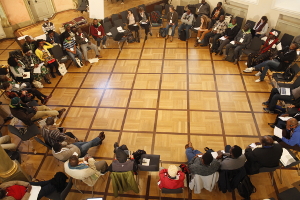 Report from the Global Peasants’ Rights Congress from 7-10 March 2017 in Schäbisch Hall, Germany
Report from the Global Peasants’ Rights Congress from 7-10 March 2017 in Schäbisch Hall, Germany
Honoring International Women’s Day, an international delegation of women kicked off the Global Peasants’ Rights Congress last Wednesday, held in the rural region of Schwäbisch Hall, Germany, with a mystica.
In the opening of the event, Elizabeth Mpofu, General Secretary of La Via Campesina reaffirmed that “the need for a UN Declaration on the Rights of Peasants is more urgent than ever.” Peasants around the world “promote a model based on Food Sovereignty and support agroecological peasant agriculture as a solution to food, climate and social crisis. In championing the rights of peasants and other people working in rural areas, she argued, humanity also wins.”
In her speech, Ms Mpofu stressed how the need for a UN Declaration on the Rights of Peasants and other People Working in Rural Areas is all the more urgent and evident in the 21st century. “Despite years of campaigning for better recognition and protection of the rights of peasants, displacements and criminalization continue affecting hundreds of thousands of peasants globally.”
It was in 2001 that Serikat Petani Indonesia – peasant organisation from Southeast Asia, under the leadership of Henry Saragih, initiated the bottom-up process for a Peasants’ Rights Declaration. After much effort, international unity and coordination, the process has now arrived at a crucial point. This May the UN Open-ended intergovernmental Working Group will meet for the 4th time and will try to finalize and find consensus for a final version of the declaration.
The crucial importance to uphold the rights of peasants, fishers, rural workers, migrant workers, shepherds, beekeepers, indigenous peoples and other people working in rural areas was highlighted in a wide array of testimonies and richly diverse presentations and working groups of the Peasants’ Rights Congress. On the second day, participants discussed which peasants’ rights are violated and how they could be protected by a UN Declaration on the Rights of Peasants and other People Working in Rural Areas. In five working groups they addressed the challenges regarding seeds, access to land, a proper income, biodiversity, repression and criminalization of peasants.
Peasant representatives, academics, legal experts, activists and political representatives took turns covering the multifaceted stakes of obtaining a Peasants’ Rights Declaration in the United Nations: food, economic and environmental well-being. It rang loud and clear that the agricultural model promoted by dominant State policies benefiting corporate interests must be countered by empowering rural communities and supporting an agricultural model based on Food Sovereignty and agroecology.
On the last day of the Global Peasants’ Rights Congress Guy Kastler (La Via Campesina) and Pat Mooney (ETC group) linked the development of new GMOs (New Breeding Techniques) with agri-business mergers. “Two-thirds of the seed market is currently controlled by six corporations that are trying to merge into three, highlighted Pat Mooney. More mergers in the agri-business sector will follow though. If we don’t have Peasants’ Rights then the only group in the world to know what is happening in the fields, in the land, will be these big companies. Considering that 70% of the food the world consumes comes from peasant farming we need to give rights and guarantee these rights to peasants otherwise we won’t have food.”
Guy Kastler hammered on, “the new breeding techniques (New GMOs) put forth by the Industry are weapons of mass destruction, destruction of our Rights, of biodiversity and of Peoples’ sovereignty.”
In his intervention in the Congress’s panel “The recognition of the peasantry as right holder – the voices of people working in rural areas rise up”, Federico Pacheco, from the Sindicato de Obreros del Campo (Field Workers Union-Andalucia) argued that the declaration on the rights of peasants is a reference, a central element to pay attention to the needs of the rural world and defend another agricultural model. “Why do we need a Declaration? Because working conditions in the rural world are extreme and none of the existing instruments have proved to be efficient, he declared, the system encourages the displacement of persons, forcing them to accept unworthy working conditions.” Economic and social rights in the rural world are very seldom respected, Mr Pacheco continued. “With this Declaration, we could exercise our right to not be forced to migrate, and have better working and social conditions. Raising awareness and mobilizing in favor of this Declaration have to be a priority since it is a fundamental step forward for the world’s peasantry.”
The Congress -organized by the “Haus der Bauern” foundation together with the European Coordination Vía Campesina, AbL and FIAN International and FIAN Germany– was wrapped up by the presentation of a draft manifesto on the need for a Peasants’ Rights Declaration, enhanced with comments and suggestions from the audience. The text – whose final version you can find here – highlights, among others, the need for German and European governments to support this historic process and the harm created to peasants by the EU’s current Common Agricultural Policy.
With the three days of rich exchanges, the Global Peasants’ Rights Congress in Schwäbisch Hall, has set the pace for the needed global collective effort ahead of this May’s UN Open-ended intergovernmental Working Group, which will try to finalize the Peasants’ Rights Declaration.
Globalize the struggle! Globalize hope!
Images by: Hannes Jung (instagram.com/hannes.jung)
